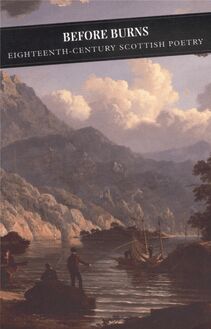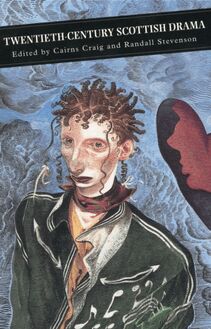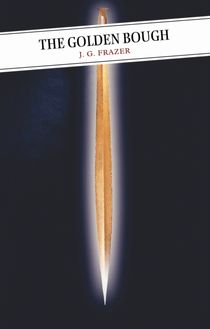-
 Univers
Univers
-
 Ebooks
Ebooks
-
 Livres audio
Livres audio
-
 Presse
Presse
-
 Podcasts
Podcasts
-
 BD
BD
-
 Documents
Documents
-
- Cours
- Révisions
- Ressources pédagogiques
- Sciences de l’éducation
- Manuels scolaires
- Langues
- Travaux de classe
- Annales de BEP
- Etudes supérieures
- Maternelle et primaire
- Fiches de lecture
- Orientation scolaire
- Méthodologie
- Corrigés de devoir
- Annales d’examens et concours
- Annales du bac
- Annales du brevet
- Rapports de stage
La lecture à portée de main
Vous pourrez modifier la taille du texte de cet ouvrage
Découvre YouScribe en t'inscrivant gratuitement
Je m'inscrisDécouvre YouScribe en t'inscrivant gratuitement
Je m'inscrisEn savoir plus
Vous pourrez modifier la taille du texte de cet ouvrage
En savoir plus

Description
Sujets
Informations
| Publié par | Canongate Books |
| Date de parution | 01 juillet 2010 |
| Nombre de lectures | 0 |
| EAN13 | 9781847675736 |
| Langue | English |
Informations légales : prix de location à la page 0,0600€. Cette information est donnée uniquement à titre indicatif conformément à la législation en vigueur.
Extrait
The Scottish Enlightenment
AN ANTHOLOGY
edited and introduced by
Alexander Broadie
Contents
Preface
PART I INTRODUCTION WHAT WAS THE SCOTTISH ENLIGHTENMENT?
PART II HUMAN NATURE
1 David Hume – The Science of Man
2 Dugald Stewart – The Unity of the Sciences
3 David Hume – The Theory of Ideas
4 Thomas Reid – Mind and its Operations
PART III ETHICS
5 Francis Hutcheson – Morality and the Moral Sense
6 David Hume – Morality and Benevolence
7 Adam Smith – Sympathy, Propriety and Merit
8 Hugh Blair – On the Proper Estimate of Human life
PART IV AESTHETICS
9 Francis Hutcheson – A Sense of Beauty
10 Francis Hutcheson – Laughter and Self-love
11 David Hume – Of the Standard of Taste
12 Thomas Reid – Beauty and Common Sense
13 Thomas Reid – The Craft of Painting
PART V RELIGION
14 Adam Smith –The Rules of Morality and the Laws of God
15 David Hume – Of Miracles
16 George Campbell – Of Miracles
17 Hugh Blair – On our Imperfect Knowledge of a Future State
18 Henry Home, Lord Kames – The Benevolence of God
19 David Hume – Dialogues Concerning Natural Religion
PART VI ECONOMICS
20 David Hume – Of Commerce
21 Sir James Steuart – The Principles of Political Economy
22 Adam Smith – The Division of Labour and the Provision of Education
23 Sir John Sinclair – Statistical Account of Forfar
PART VII SOCIAL THEORY AND POLITICS
24 Adam Smith – The Four Stages of Society
25 John Millar – The Origin of the Distinction of Ranks
26 Adam Ferguson – The Origins of Civil Society
27 David Hume – Of the First Principles of Government
28 David Hume – Of the Origin of Government
29 Henry Home, Lord Kames – The Rise and Fall of Patriotism
30 John Millar – The Powers of the Sovereign
31 Adam Ferguson – liberty and the Law
32 Sir John Sinclair – The Statistical Account of Scotland
33 Sir John Sinclair – Memorial of the Parish Schoolmasters of Scotland
PART VIII LAW
34 David Hume – Of Justice
35 John Erskine of Carnock – Of Laws in General
36 Adam Smith – Duties of the Sovereign
37 Henry Home, Lord Kames – Rewards, Reparations and Final Causes
PART IX HISTORIOGRAPHY
38 Adam Smith – A History of Historians
39 Dugald Stewart – Conjectural History
40 William Robertson – Comparative History
PART X LANGUAGE
41 George Campbell – The Philosophy of Rhetoric
42 Adam Smith – Considrations Concerning the First Formation of Languages
43 James Dunbar – On Language as a Universal Accomplishment
PART XI SCIENCE
44 Adam Smith – Scientific Discovery
45 John Gregory – The Duties and Qualifications of a Physician
46 William Smellie – Animal, Vegetable and Mineral
47 James Hutton – Theory of the Earth
48 Colin Maclaurin – Newtonian Science
Appendix: Biographical Sketches of Authors
Bibliography
Index
Preface
To select material for a Scottish Enlightenment Anthology requires hard choices regarding not only authors but also fields. Some major fields within the Scottish Enlightenment are not represented in this Anthology. Seminal writings on engineering and chemistry, by James Watt and Joseph Black, have been omitted because the relevant writings are technically difficult and would require considerable commentary to make them generally accessible. Neither have I included anything of the fictional or poetical writings of the day, though fiction and poetry are certainly media for the exploration of human nature, a field of central concern to the enlightened thinkers of Scotland. Such media are not however in general the best way to participate in debates, to develop lines of argument for or against given theses, and it is to writings of such a nature, which are found in academic fields such as philosophy and science, that I have turned for excerpts. Nevertheless I have presented, within the constraints of space, excerpts illustrative of a wide range of fields, since the sheer breadth of achievement of the Scottish Enlightenment is itself one of its glories. At the same time the selected authors have been given ample room to develop their arguments – this is not an anthology of sound bites.
In line with the rather common Enlightenment view that philosophy is a central discipline and particularly the part of philosophy that focuses upon human nature, the Anthology starts with that topic, drawing its material from Hume, greatest of Scotland’s Enlightenment philosophers, and from the school of common sense. Thereafter Parts III, IV and V, covering ethics, aesthetics and religion, can be seen as providing in a variety of ways further content to the concept of human nature, by probing our moral and aesthetic judgments to determine the nature of their relation to feelings, and to determine the extent to which it makes sense to speak of moral and aesthetic qualities as existing independently of our feelings and judgments. The excerpts in these Parts include a number of seminal passages by Hutcheson, Hume, Smith and Reid. As regards the philosophy of the Scottish Enlightenment these four are self-selecting. In Part V on religion Hume again has a voice. Miracles were commonly cited as evidence for the existence of God, and in a famous article, Hume sought to argue against the value of the evidence provided by reports of miracles. This article is given in full in Part V, along with an excerpt from a counterblast by George Campbell. Hugh Blair’s sermon ‘On our imperfect knowledge of a future state’, delivered at the High Kirk of St Giles in Edinburgh, is also given in full, as an example of Scottish Enlightenment pulpit oratory at its best. In Parts VI–XI many of the authors excerpted were self-selecting, such as Smith and Steuart on economics, Millar and Ferguson on social theory, Erskine and Kames on law, William Robertson on history, Hutton on geology and Maclaurin on Newtonianism. Though many others could have been selected, a line has to be drawn somewhere.
Some of the excerpts are taken from works that are readily accessible, and some might think this a sufficient reason to exclude them, but I preferred not to exclude them from an Anthology intended to represent the best of the work done in the Scottish Enlightenment, especially when those excerpts provide an important part of the context within which other valuable works are to be understood and assessed. Nevertheless I am conscious of the fact that it is possible to compile an admirable Scottish Enlightenment Anthology containing only excerpts that are of the highest quality and that are also not readily accessible. Indeed an indefinitely large number of admirable Scottish Enlightenment Anthologies, all of them constructed on perfectly reasonable principles and yet differing totally from each other in their content, could easily be constructed. It was also necessary to decide whether to modernise the spelling and punctuation of these eighteenth-century texts. I have not modernised, though I recognise that there are arguments on both sides.
Any selection is bound to reflect the interests and even the ideological stance of the compiler. An evangelical theologian and a historian of technology would not compile the same Anthology. My own interests and ideological stance are simply stated – I am a philosopher with a particular sympathy for the Scottish school of common sense – and these personal facts are plainly reflected in the choice of excerpts. Some perspectives are of course better than others at yielding insights into the true nature of the Scottish Enlightenment and, for reasons I indicate in Part I, I believe philosophers to be particularly well placed to discern what really happened. But as my friends out there are sure to reply: ‘He would believe that, wouldn’t he.’
As compiler of a wide-ranging Anthology I have sought wide-ranging help, and am deeply indebted to the wise counsel given me by Professors Christopher Berry, William Gordon, Andrew Skinner, David Walker and Paul Wood regarding suitable texts and to Dr Donald Withrington who provided invaluable material on Sir John Sinclair’s Statistical Account of Scotland . Miss P. S. Martin proffered advice, much of it promptly accepted, on stylistic matters. For all this help so generously given I am truly grateful.
Alexander Broadie Glasgow 1997
PART I
INTRODUCTION WHAT WAS THE SCOTTISH ENLIGHTENMENT?
INTRODUCTION
I
To understand the Scottish Enlightenment it is necessary both to grasp the concept of Enlightenment, and also to appreciate the fittingness of the application of the concept to eighteenth-century Scotland. I shall begin by discussing the concept and shall then turn to its specifically Scottish dimension.
Much the most influential account of the nature of Enlightenment that has come down to us from the Age of Enlightenment was written not by a Scot but by a German, Immanuel Kant (1724–1804). Since I shall be stressing the fact that the Scottish Enlightenment was the Scottish contribution to a more than Europe-wide movement, it is appropriate to consider the concept of Enlightenment as expounded by perhaps the greatest philosopher of the European movement, particularly in view of the fact that Kant’s account accords closely with events in Scotland and in view also of the extent to which Scottish philosophers influenced him. 1 In 1785 he wrote a short essay in response to a request from the Berlinische Monatsschrift for an answer to the question ‘What is Enlightenment?’ 2 He defined Enlightenment as ‘man’s release from his self-incurred tutelage’, tutelage being the inability to make use of one’s understanding without direction from another. It is self-incurred if failure to use one’s own understanding is due to laziness and cowardice. Kant therefore suggests as a motto for the Enlightenment: ‘Sapere aude – Dare to know’ or, as he paraphrases the Latin injunction: ‘Have courage to use your own rea
-
 Univers
Univers
-
 Ebooks
Ebooks
-
 Livres audio
Livres audio
-
 Presse
Presse
-
 Podcasts
Podcasts
-
 BD
BD
-
 Documents
Documents
-
Jeunesse
-
Littérature
-
Ressources professionnelles
-
Santé et bien-être
-
Savoirs
-
Education
-
Loisirs et hobbies
-
Art, musique et cinéma
-
Actualité et débat de société
-
Jeunesse
-
Littérature
-
Ressources professionnelles
-
Santé et bien-être
-
Savoirs
-
Education
-
Loisirs et hobbies
-
Art, musique et cinéma
-
Actualité et débat de société
-
Actualités
-
Lifestyle
-
Presse jeunesse
-
Presse professionnelle
-
Pratique
-
Presse sportive
-
Presse internationale
-
Culture & Médias
-
Action et Aventures
-
Science-fiction et Fantasy
-
Société
-
Jeunesse
-
Littérature
-
Ressources professionnelles
-
Santé et bien-être
-
Savoirs
-
Education
-
Loisirs et hobbies
-
Art, musique et cinéma
-
Actualité et débat de société
- Cours
- Révisions
- Ressources pédagogiques
- Sciences de l’éducation
- Manuels scolaires
- Langues
- Travaux de classe
- Annales de BEP
- Etudes supérieures
- Maternelle et primaire
- Fiches de lecture
- Orientation scolaire
- Méthodologie
- Corrigés de devoir
- Annales d’examens et concours
- Annales du bac
- Annales du brevet
- Rapports de stage















